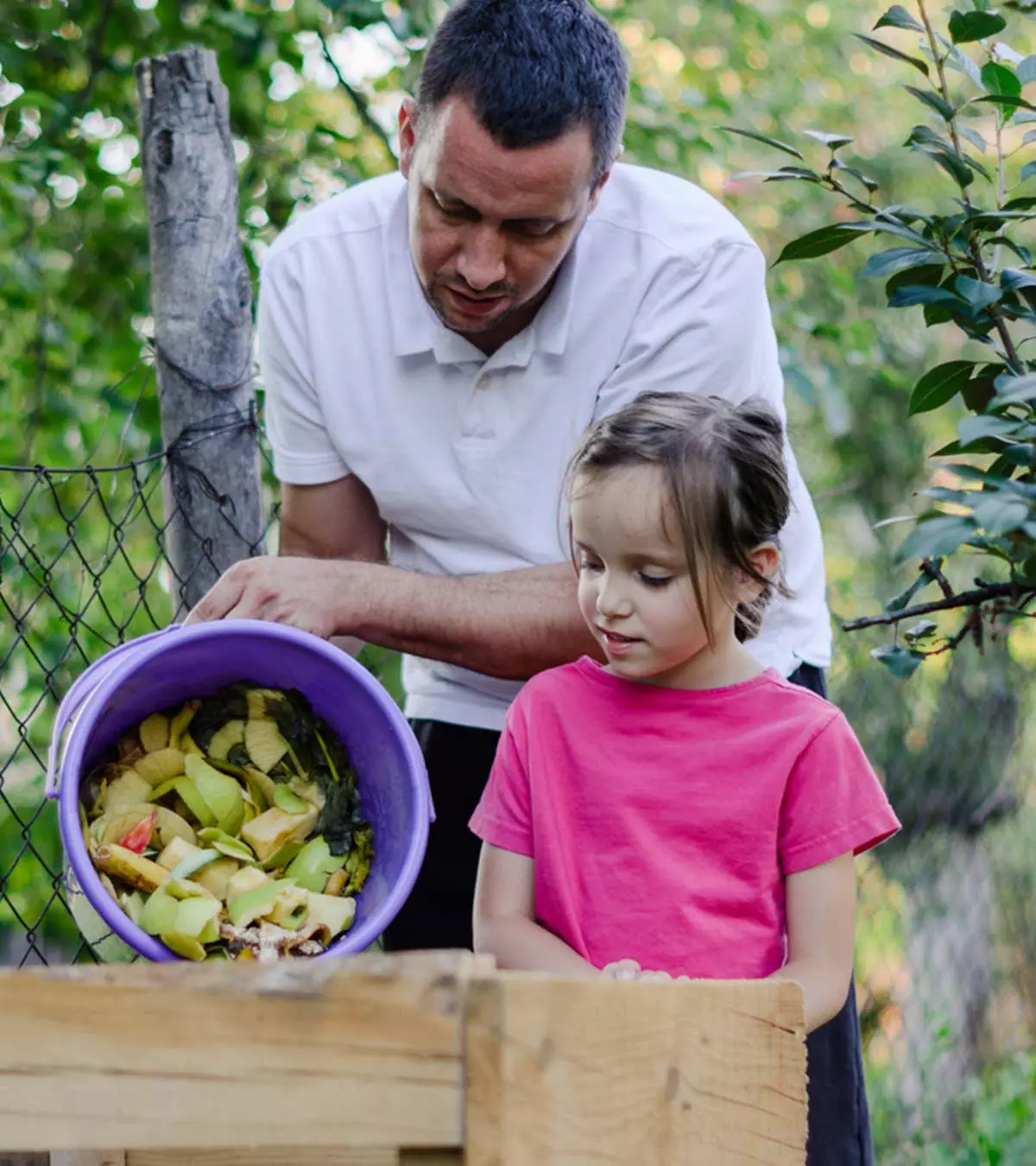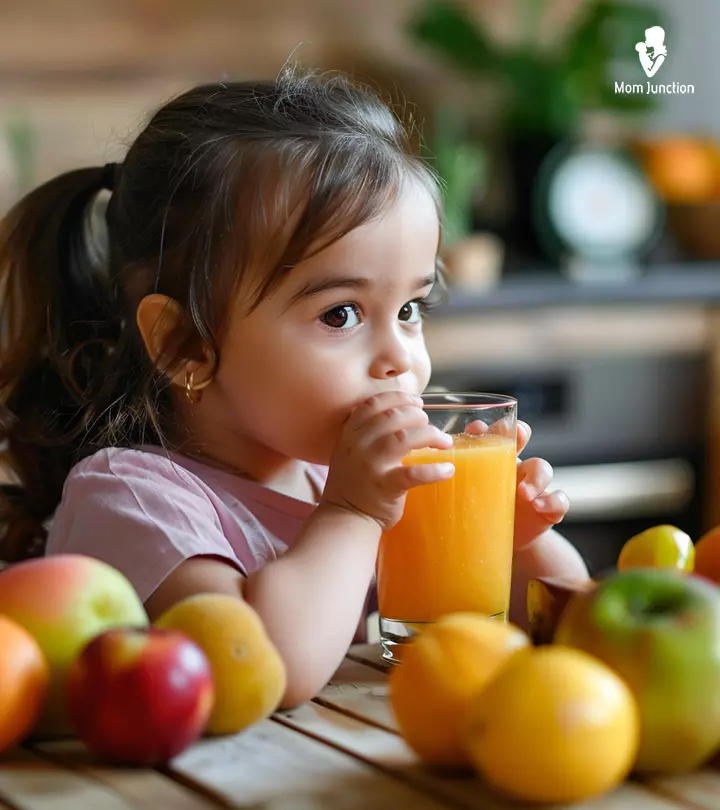
Image: Midjourney/ MomJunction Design Team
Juices for kids, made with fruits or vegetables, are a great hydrating source and replenish essential nutrients. They’re easily available, or you can make them at home for a healthier option without added sugars, preservatives, or artificial flavors. However, in either case, you should limit excessive juice consumption to avoid negative consequences, such as obesity and dental damage in children (1). This post discusses some nutritious juices and some delicious juice recipes for you to try.

Key Pointers
- Try to choose juices without added sugar. Homemade juices offer a healthier option without additives or preservatives.
- Apple lemonade, carrot juice, beetroot juice, and cherry juice could be healthier options for kids.
- It’s important to follow guidelines for juice consumption based on age to ensure children get the right amount for their needs.
Are Juices Healthy For Children?
Water is the best liquid to keep children hydrated. Juices are a lovely treat in appropriate portions from time to time. However, as a routine, children should eat whole fresh fruits and vegetables, as they offer several nutrients for proper growth and brain development.
According to a US Centers for Disease Control and Prevention (US CDC) report, one in three children aged 1 to 5 years does not eat fruit daily, while one in two children does not eat vegetables daily (2). Hence, parents must encourage children to consume whole fruits and veggies in snacks, meals, and even drinks, such as freshly squeezed juices.
Fresh juices are often unavailable, and parents have to rely on packaged alternatives. Store-bought juices are available in different forms, such as 100%, concentrated, and diluted. Out of these, moderate consumption of 100% fruit juice as part of a healthy diet may provide children with vital nutrients, without contributing to weight gain (3). However, many packaged juices contain added sugar, preservatives, and artificial ingredients. So, read the label carefully and check the ingredient list before purchasing.
Juices may be useful in the following ways.
- Juices can work as a medium to encourage children to eat whole fruits and vegetables.
Ciara, a mother of two, food writer, and cookbook author, explains how juices have helped her introduce more veggies into her children’s diet. She opines, “Lately, I have been introducing my little fussy eater to more and more ambitious fruit and vegetable juice concoctions. She was quite resistant at first but now will drink small amounts of most juices that I make (i).”
- Moderate consumption of fruit juices can provide flavonoids that possess antioxidant properties with long term health benefits, such as improved cardiovascular health (4) (5).
- Juices contain polyphenolsiNaturally occurring antioxidant compounds found in food items such as fruits, vegetables, coffee, tea, and wine , oligosaccharidesiCarbohydrates containing three to ten simple sugars and found in plant-based foods such as legumes, grains, and vegetables , and nitrates that may work as prebiotics good for gut health (6).
- Juices can provide essential vitamins and minerals, such as vitamin C and potassium, supporting overall health and development (7).
- Drinking 100% fruit and vegetable juice may support heart health, brain function, and exercise performance in children (8).
How Much Juice Can Children Have?
According to the USDA, unsweetened 100% juices are a part of the fruit and vegetable group. Juice should contribute to half or less than half of the total recommended fruit and vegetable intake for the day (9).
Below is the age-appropriate recommendation for fruit juice intake for children (10). However, remember that juices are not a daily necessity if your child enjoys their daily recommended quota of fruits and vegetables for kids.
| Age (years) | Recommended Daily Serving |
| 4 to 6 | ½ to ¾ of a cup or 6 ounces |
| 7 to 18 | 1 cup or 8 ounces |
Source: American Academy of Pediatrics
Tips To Select Healthy Juices For Children
Selecting healthier options of juices is necessary to enjoy their benefits. Consider these points while buying fruit or vegetable juice for children.
- According to the US Food and Drug Administration (US FDA), a product is labeled “fruit juice” and “vegetable juice” when the contents are 100% sourced from fruits and vegetables, respectively (11). These juices do not contain any additives, including preservatives.
- 100% fruit or vegetable juice with additives is mentioned on the label. For instance, 100% fruit juice with sugar is mentioned as “100% fruit juice with added sugar/sweetener.” Similarly, 100% fruit juices with preservatives state, “100% fruit juice with preservatives (11).”
- Some manufacturers make 100% fruit juice by adding water to fruit juice concentrates (7). These juices are called “reconstituted 100% fruit juices.”
- Check the list of ingredients along with the nutritional information to know about the ingredients, along with the number of nutrients per serving.
- Give preference to “100% fruit and vegetable juice,” which does not contain added sugar. Added sugars, such as fructoseiSimple sugar that makes up 50% of table sugar and corn syrup, can increase the risk of tooth decay, weight gain, and high blood pressure (12). Long-term consumption of sweetened juice could increase the risk of childhood obesity.
- Opt for juices with low sodium content since high sodium intake is associated with higher blood pressure.
- Vegetable juices contain less natural sugar than fruit juice. Thus, prefer mixed fruit and vegetable juice for optimum nutrition.
Try to make juices at home instead of buying the packaged versions. They are fresh, and you have control over what goes into them.
 Expert says
Expert says13 Healthy And Delectable Juice Recipes For Children
Making juice at home lets you have control over the ingredients. Besides, it can reduce the ingestion of unwanted additives, preservatives, and sweeteners. Thoroughly wash the fruits and vegetables under running water before preparing juice to prevent the risk of foodborne illnesses (13).
Here are some interesting juice recipes you can try for your child. You may also teach them about the different healthy foods for kids as you introduce them to these juices.
1. Apple lemonade

Here’s an easy-to-prepare, refreshing, and nourishing variety of lemonade to let your children beat the heat. It is one of the most healthy drinks for kids.
You will need:
- 1 cup apple (peeled, cored, and sliced)
- ½ cup fresh lemon juice
How to:
- Prepare apple juice and add lemon juice to it.
- Refrigerate for ten minutes and serve chilled.
- You can add some crushed mint leaves and a pinch of cinnamon to enhance palatability.
2. Pineapple and kale juice
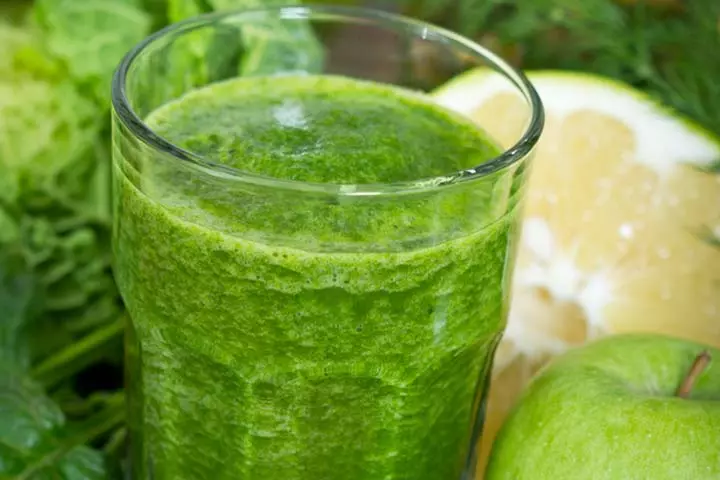
This hydrating, nutrient-rich, and tasty juice recipe is suitable for children of any age.
You will need:
- 100g fresh kale (chopped)
- 1 cup pineapple (chopped)
- Water
How to:
- Juice the ingredients well until you get a smooth liquid.
- Serve fresh, or you can refrigerate it for five minutes.
- You can add chia seeds to improve the overall nutritional value of the recipe.
3. Carrot and orange juice

The juice contains vitamin C and fiber, thus making it one of the most nourishing juices for children. Furthermore, you may enhance it’s nutritional value by adding a dash of pomegranate juice.
You will need:
- 2 carrots (peeled and chopped)
- 1 orange (peeled and deseeded)
How to:
- Juice the ingredients until you observe a semi-thick liquid.
- Serve immediately or refrigerate for five minutes.
- You can add a pinch of cinnamon or mint leaves before serving to boost the recipe’s flavor.
 Do remember
Do remember4. Apple, sweet potato, and carrot juice
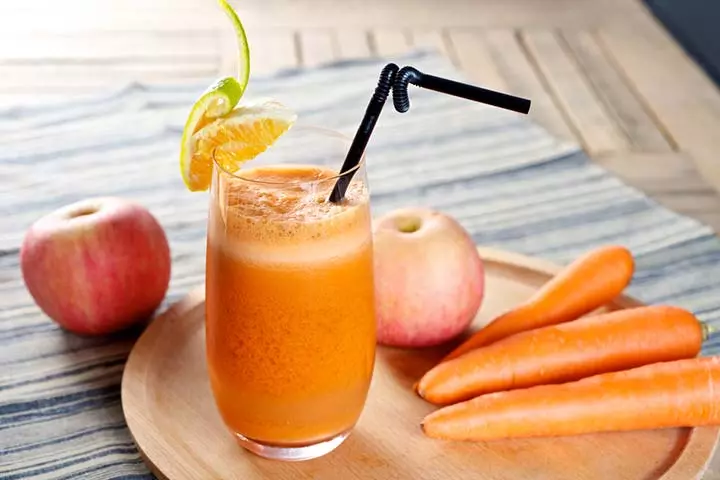
The satiating homemade juice recipe is rich in nutrients and fiber. Serve it to alleviate hunger pangs and maintain a healthy digestive system.
You will need:
- 1 apple (cored, peeled, and chopped)
- 1 sweet potato (peeled and diced)
- 1 carrot (peeled and chopped)
How to:
- Juice all the ingredients into a creamy consistency.
- Serve immediately or refrigerate for no more than a day.
5. Mixed berry splash

If your child likes strawberry juice, you might want to introduce them to a more refreshing drink, such as mixed berry splash. The antioxidant and iron-rich juice is beneficial for the immune system.
You will need:
- 1 cup mixed berries (strawberry, blueberry, and raspberry)
- 1 cup watermelon (deseeded and chopped)
How to:
- Put all the fruits in a blender and blend into a smooth juice.
- Serve immediately or store it in the refrigerator for a day or two.
- You can add a cup of Greek yogurt, a handful of nuts, and a teaspoon of chia seeds to turn this recipe into a healthy smoothie.
6. Apple and beetroot juice

Beetroot is rich in phytonutrientsiA broad term for compounds found in fruits, vegetables, grains, and beans, possessing health-promoting properties , such as betalainsiA colored bioactive pigment with cell-protective and anti-inflammatory properties , flavonoids, and polyphenols that have health-promoting properties (14). This Juice is popularly known as ABC, short for Apple, beetroot, and carrot juice.
You will need:
- 1 apple (cored, peeled, and chopped)
- 2 carrots (peeled and chopped)
- ½ beetroot (peeled and chopped)
How to:
- Juice all the ingredients into a semi-thick juice. If the juice looks too thick, add water to adjust consistency.
- Refrigerate the juice for ten minutes before serving it. You may store the juice for up to two days.
 Quick tip
Quick tip7. Minty berry juice

It is one of the most nourishing and immune-boosting juices for children across ages. Your child would definitely love it if they are already a fan of strawberry and blueberry juice.
You will need:
- 1 apple (cored, peeled, and diced)
- 1 kiwi (peeled and chopped)
- 1 cup mixed berries (blueberries and strawberries)
- 4-5 mint leaves
How to:
- Make a semi-thick apple, berries, and kiwi juice.
- Add mint leaves and refrigerate for ten minutes.
- Serve with a midday snack, like a vegetable sandwich.
8. Green juice

This lip-smacking juice is a hydrating and nutrient-rich combination of spinach, cucumber, grapes, and orange.
You will need:
- 1 cup spinach leaves (chopped)
- 1 cup cucumber (peeled and diced)
- 1 cup grapes
- 1 orange (peeled and deseeded)
- 1tsp ginger juice
- Pinch of cinnamon
How to:
- Juice spinach leaves, cucumber, grapes, and orange into a semi-thick liquid.
- Add ginger juice and cinnamon just before serving.
- Serve with any grilled main dish of your choice.
9. Tropical twist
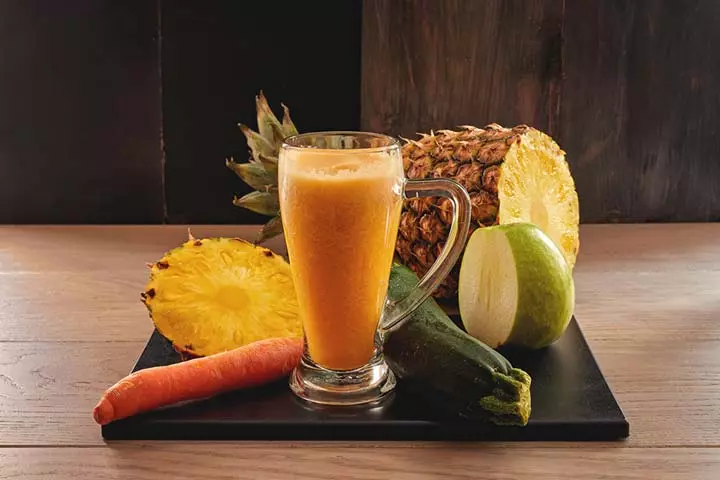
The energy-rich tropical juice has tangy-sweet flavors.
You will need:
- 1 cup pineapple (chopped)
- 1 cup carrot (peeled and chopped)
- 1 cup apple (peeled, cored, and chopped)
- 1tsp lemon juice
- ½tsp ginger juice
How to:
- Juice all the vegetables into a thin-liquid. If needed, add water to adjust consistency.
- Add lemon and ginger juice and serve immediately.
- You can also add some mint leaves.
10. Tangy tomato juice

It is a tangy-flavored, immune-boosting, and detoxifying juice recipe for children.
You will need:
- 2 ripe tomatoes (cored and chopped)
- 1 carrot (peeled and chopped)
- 1 celery stalk (chopped)
- ¼tsp black pepper powder
How to:
- Juice tomatoes, carrot, and celery into a smooth-flowing juice.
- Add black pepper and serve immediately.
11. Fennel and blueberry juice

The delectable summer drink has immune-boosting properties. Replace fennel with mint if your child dislikes fennel’s strong flavor.
You will need:
- 1 fennel bulb (chopped)
- 1 apple (peeled, cored and diced)
- 50g blueberries (frozen)
- 1tsp lemon juice
How to:
- Juice fennel bulb, apple, and blueberries into a smooth liquid.
- Add lemon juice, mix well, and serve immediately.
12. Honeydew melon juice

It is one of the best juice recipes to hydrate, nourish, and satiate your child.
You will need:
- 2 cup honeydew melon (deseeded and chopped)
- 1 cup cucumber (peeled and sliced)
- 1tbsp lime zest
How to:
- Juice melon and cucumber into a smooth liquid.
- Add lime zest, mix well, and serve immediately.
- Alternatively, you can add a few mint leaves and refrigerate the juice before serving.
13. Cherry limeade
You will need:
- Crushed ice
- 2 medium limes, sliced
- 1 jar maraschino cherries, drained with the syrup reserved
- 1 cup chilled lime juice
- 1/2 cup superfine granulated sugar
- 1 bottle chilled lemon-lime soda
How to:
- Fill a pitcher halfway with crushed ice and adorn it with thinly sliced lime.
- Incorporate maraschino cherries, reserving the syrup for later use.
- Combine chilled lime juice and superfine granulated sugar in a medium bowl, ensuring sugar dissolves.
- Transfer the lime juice mixture to the pitcher, adding the reserved cherry syrup.
- Integrate lemon-lime soda, gently stirring to blend all elements.
- Serve the refreshing concoction promptly, delivering freshness and delightful flavors
Precautions To Take While Giving Juice To Children
Observing some precautionary steps can help the child avoid the adverse effects and get the most out of juices (15) (16) (17).
- Purchase only pasteurized or shelf-stable 100% fruit or vegetable juices to avoid foodborne illnesses.
- Avoid feeding unpasteurized juices produced at a farm, to young children.
- Serve juice with meals and not between meals. Serving juice between meals may increase the risk of tooth decay.
- Do not serve juice as a replacement for water, milk, or other healthy beverages.
- Spread the recommended daily serving of fruit juice across all the meals.
- Avoid serving juice in bottles and sippy cups as sipping juices for a long period contributes to tooth decay in young children.
- Use properly cleaned utensils and juicer/ blender to prepare juices at home.
- Wash vegetables and fruits properly and discard parts or produce that looks damaged, bruised, or rotten.
- Before and after preparation, wash hands with soap and warm water for at least 20 seconds.
- Do not strain the juice as retaining the pulp ensures enhanced fiber intake.
- You can add a pinch of sugar or salt to homemade juice for taste. Avoid adding any salt or sugar to packaged 100% fruit juices.
- Do not give fruit juice to young children around bedtime as it might cause digestive issues, like indigestion, gas, and diarrhea.
- If your child has the juice for the first time, begin feeding small amounts to monitor for any allergic reactions or digestive issues.
- Follow age-appropriate juice intake guidelines and avoid overfeeding juices to your child.
- If your child has dietary restrictions, choose suitable ingredient substitutions. You can use coconut or almond milk for dairy allergies, apples or pears instead of citrus, and maple syrup or dates as a vegan alternative to honey.
Frequently Asked Questions
1. At what age can I give juice to my child?
You can safely introduce juice to your child after they turn 12 months old. However, it’s important to limit their juice intake as it can add extra calories without providing many nutritional benefits. It’s good to keep in mind that juice should be consumed in moderation as part of a balanced and nutritious diet (18).
2. What effects does juice have on children?
Previously, drinking juice was recommended for kids because they have vitamin C and can help with constipation. But eventually, it is being discouraged as juices have too much sugar and not enough fiber. This can make kids gain weight and have cavities in their teeth (7).
3. Should I dilute juice for kids?
Yes, you can dilute your child’s juice with water if there’s too much sugar. Make sure you are giving them 100% juice and not fruit drinks that mainly contain sugar. Parents also dilute juices to help with constipation or provide supplementary fluids to their children (7).
4. Can kids drink ABC juice?
Yes, children can drink ABC juice. ABC juice stands for apple beetroot carrot juice. It is considered a healthy alternative compared to packed fruit juices.
5. Is flavored water better than juice for kids?
Flavored water is generally considered a healthier alternative to sodas, packaged juices, and smoothies for kids. However, some brands may add natural or synthetic flavors to their water. It is advisable to make your own flavored water at home rather than buying bottled flavored water.
6. Is Gatorade good for kids?
Gatorade may not be recommended for children’s consumption because sports drinks usually contain sugar, sodium, and calories that may significantly impact the child’s health, like obesity and cavities (19).
7. Are there any creative ways to serve juices to kids?
You can transform fruit pulps and juices into fun and delectable treats like juice popsicles, smoothies, or mocktails. Avoid adding extra sugar and serve them based on the weather and occasion to make it enjoyable for kids. To get children involved, let them help with washing and peeling fruits or pressing the juicer button. Older kids can safely cut soft fruits under supervision.
8. What are the best fruits and vegetables for making juice for kids?
Apples, oranges, watermelons, and berries are among the most popular fruits for juices due to their inherent sweetness and high nutrient content. For vegetables, carrots, cucumbers, and spinach are healthy options for kids. While making juices, try to keep the flavors balanced and use seasonal fruits and vegetables.
9. How should I store homemade juice?
Store fresh juice in airtight, opaque glass containers to prevent oxidation and light exposure. Glass containers don’t leach harmful chemicals like plastic. You can refrigerate fresh juice for up to 1-2 days for minimal nutrient loss or freeze for more extended storage.
Try these healthy and refreshing juices for kids to reap the excellent health benefits of the ingredients. You may include these juices to fulfill your children’s nutritional requirements in a well-balanced diet. However, keep checking the quantity and avoid giving packed and too-sweetened juices. You may further guide them to be conscious of the nutritional facts of the juices to make a healthy choice. Also, involve them in preparing homemade juices to educate them about the significance of choosing healthy dietary potions.
Illustration: Healthy Juices For Kids: 13 Easy Homemade Juice Recipes

Image: Stable Diffusion/MomJunction Design Team
Infographic: Interesting Ways Children Can Eat Juices
Juices are nutrient-rich beverages children can consume sparingly. But did you know that different vegetable and fruit juices can be turned into eatables? In this infographic, we share different ways parents can use juices to prepare attractive and nutritious food items for their children. Go through the infographic and share it with fellow parents to help them turn fresh, homemade juices into delicious food items.
Some thing wrong with infographic shortcode. please verify shortcode syntax
Juicing is a great way to get kids to eat their fruits and veggies! Learn the best juices for kids and toddlers in this video. Get tips on how to make healthy and delicious juices for your little ones.
Personal Experience: Source
MomJunction articles include first-hand experiences to provide you with better insights through real-life narratives. Here are the sources of personal accounts referenced in this article.
i. Four kid friendly juice recipes;https://www.myfussyeater.com/four-kid-friendly-juice-recipes/
References
- Soft drinks, juice and sweet drinks – children.
https://www.betterhealth.vic.gov.au/health/healthyliving/soft-drinks-juice-and-sweet-drinks-children - Fruit, Vegetable, and Sugar-Sweetened Beverage Intake Among Young Children, by State — United States, 2025.
https://www.cdc.gov/mmwr/volumes/72/wr/mm7207a1.htm - Kristi Crowe-White et.al; (2016); Impact of 100% Fruit Juice Consumption on Diet and Weight Status of Children: An Evidence-based Review.
https://pubmed.ncbi.nlm.nih.gov/26091353/ - Flavonoids.
https://lpi.oregonstate.edu/mic/dietary-factors/phytochemicals/flavonoids - Jie Zheng et.al; (2017); Effects and Mechanisms of Fruit and Vegetable Juices on Cardiovascular Diseases.
https://www.researchgate.net/publication/314486111_Effects_and_Mechanisms_of_Fruit_and_Vegetable_Juices_on_Cardiovascular_Diseases - Susanne M Henning et.al; (2017); Health benefit of vegetable/fruit juice-based diet: Role of microbiome.
https://pubmed.ncbi.nlm.nih.gov/28526852/ - Melvin B. Heyman et.al; (2017); Fruit Juice in Infants, Children, and Adolescents: Current Recommendations.
https://publications.aap.org/pediatrics/article/139/6/e20170967/38754/Fruit-Juice-in-Infants-Children-and-Adolescents - Irene Rossi et.al; (2025); Health effects of 100% fruit and vegetable juices: evidence from human subject intervention studies.
https://www.cambridge.org/core/journals/nutrition-research-reviews/article/health-effects-of-100-fruit-and-vegetable-juices-evidence-from-human-subject-intervention-studies/F2E7246B748741828885E76AA42A774B - Sugar and sweeteners.
https://extension.colostate.edu/topic-areas/nutrition-food-safety-health/sugar-and-sweeteners-9-301/ - Fruit Juice and Your Child’s Diet.
https://www.healthychildren.org/English/healthy-living/nutrition/Pages/Fruit-Juice-and-Your-Childs-Diet.aspx - A Food Labeling Guide.
https://www.fda.gov/files/food/published/Food-Labeling-Guide-%28PDF%29.pdf - Sugary soda and juice can boost blood pressure, weight.
https://www.health.harvard.edu/blog/sugary-soda-and-juice-can-boost-blood-pressure-weight-201103081695 - What You Need to Know About Juice Safety.
https://www.fda.gov/food/buy-store-serve-safe-food/what-you-need-know-about-juice-safety - Parvin Mirmiran et.al; (2025); Functional properties of beetroot (Beta vulgaris) in management of cardio-metabolic diseases.
https://pmc.ncbi.nlm.nih.gov/articles/PMC6947971/ - Juice Boxes: Tips for Parents.
https://www.healthychildren.org/english/healthy-living/nutrition/pages/juice-boxes.aspx - The Truth About Sugary Drinks and Your Smile.
https://www.mouthhealthy.org/nutrition/sugary-drinks - Feeding & Nutrition Tips: 4-to 5-Year-Olds.
https://www.healthychildren.org/english/ages-stages/preschool/nutrition-fitness/pages/feeding-and-nutrition-your-4-to-5-year-old.aspx - What’s Best for My Baby to Drink?
https://kidshealth.org/en/parents/babies-drink.html - Are Sports Drinks the Right Choice for Your Child?
https://www.lancastergeneralhealth.org/health-hub-home/2025/may/are-sports-drinks-the-right-choice-for-your-child
Community Experiences
Join the conversation and become a part of our nurturing community! Share your stories, experiences, and insights to connect with fellow parents.
Read full bio of Dr. Orlena Kerek
- Alicia Chacha Miller is a registered dietitian specializing in maternal and pediatric nutrition. She holds an MS in Nutrition Science from the University of Southern California and founded Cardamom Nutrition.
 Alicia Chacha Miller is a registered dietitian specializing in maternal and pediatric nutrition. She holds an MS in Nutrition Science from the University of Southern California and founded Cardamom Nutrition.
Alicia Chacha Miller is a registered dietitian specializing in maternal and pediatric nutrition. She holds an MS in Nutrition Science from the University of Southern California and founded Cardamom Nutrition.
Read full bio of Swati Patwal
Read full bio of Deepa Thomas
Read full bio of Shinta Liz Sunny








